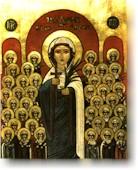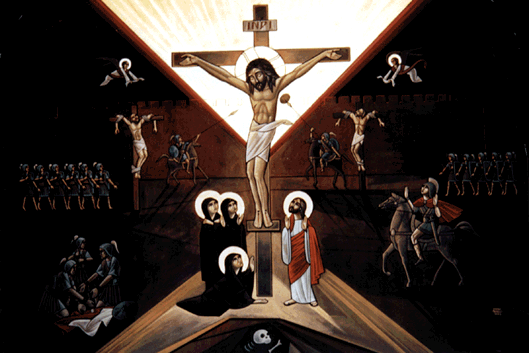|
Tute 01, 1723.
September 11, 2006

Today is the beginning
of the blessed Coptic year. It is necessary to keep it a holy day
with full purity and chastity. Let us start a new demeanor as St.
Paul the Apostle says, "Therefore if anyone is in Christ, he is a
new creation: old things have passed away; behold, all things have
become new. Now all things are of God, who has reconciled us to
Himself through Jesus Christ, and has given us the ministry of
reconciliation." (2 Cor. 5:17-18) And Isaiah the Prophet says, "The
Spirit of the Lord God is upon Me, because the Lord has anointed Me
to preach good tidings to the meek; He has sent Me to heal the
broken-hearted, to proclaim liberty to the captives. To proclaim the
acceptable year of the Lord." (Isaiah 61:1-2) And David the Prophet
says, "You crown the year with Your goodness; and Your paths drip
with abundance." (Psalms 65:11)
We ask our God to keep
us without sin and help us to act according to His will with the
intercessions of the pure Saint Mary, all the Martyrs and Saints.
Amen.
|
|
Tute 17, 1723.
September 27, 2006
On this day the church
celebrates the consecration of the church of the Honorable Cross of
our Lord Jesus Christ. The Cross was uncovered by the lover of God,
Queen Helena, mother of Emperor Constantine, from under the pile of
Golgotha, after she ordered its removal.
As for the reason of
how this great pile of dirt came into being: the Jewish leaders,
when they saw all the signs and wonders which were manifested from
the sepulchre of the Savior, such as raising the dead and healing
the sick, became angry, and they sent forth throughout Judea and
Jerusalem ordering all the people to cast the sweepings of their
houses and the dirts over the sepulchre of Jesus of Nazareth. They
continued to do so for more than 200 years, until it became a very
great heap.
When St. Helena came
to Jerusalem, and asked the Jews about the whereabouts of the Cross,
they did not inform her. Finally, some of them told her about an old
Jew called Judas who knew the place. She called him, and he denied
it at first, but when she urged him, he told her about that pile.
She ordered its removal and the Holy Cross was found. She built a
church for it, consecrated it and celebrated for the Honorable Cross
on the seventeenth day of the month of Tute. Christians make
pilgrimages to that place every year as they do on the feast of the
Resurrection.
A certain Samaritan
called Isaac, as he was travelling with his family among the people
going to Jerusalem, reproved the people for taking such trouble in
going to Jerusalem to worship a piece of wood. Among the people was
a priest whose name was Okhidus. While travelling along the road,
they became thirsty. They found no water and they came to a well
where the water was foul and bitter. The people became dismayed.
Isaac the Samaritan started mocking them, saying, "If I witness a
power by the name of the Cross, I will become a believer of Christ."
The priest Okhidus was moved with divine zeal and prayed over that
foul water and made the sign of the Cross on it, and it became
sweet. All the people and their animals drank, but when Isaac drank,
the water was bitter and wormy. He regretted and cried and came to
the saint, Father Okhidus, bowed down at his feet and believed in
the Lord Christ. Then he drank from the water, and he found it
sweet. The water of that well possessed the power of becoming sweet
for the believers and bitter for the others. A cross of light
appeared in the well and a church was built there.
When Isaac the
Samaritan arrived in Jerusalem, he went to its bishop who baptized
him and his family.
Because the feast of
the appearance of the Honorable Cross, which is on the tenth of
Baramhat, always comes during fasting, it was substituted by the
fathers for the Seventeenth of Tute which is the day of consecration
of its church.
Glory and worship be
to Jesus Christ our Lord forever and ever. Amen. |